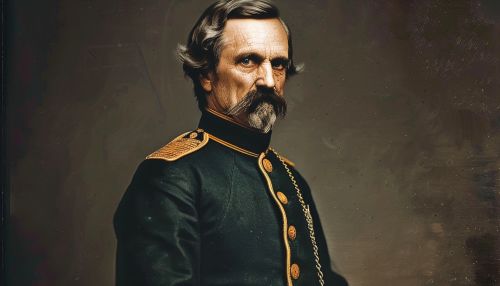John C. Breckinridge
Early Life and Education
John Cabell Breckinridge was born on January 16, 1821, in Lexington, Kentucky. He was the son of Joseph Cabell Breckinridge and Mary Clay Smith Breckinridge, both of whom were members of prominent political families. Breckinridge's paternal grandfather, John Breckinridge, served as Attorney General under President Thomas Jefferson, while his maternal grandfather, Samuel Stanhope Smith, was the president of Princeton University. Breckinridge's early education was conducted at home by private tutors, and he later attended Pisgah Academy in Woodford County, Kentucky.
In 1834, Breckinridge enrolled at Centre College in Danville, Kentucky, where he was an active member of the literary society. He graduated in 1839 and subsequently studied law at Transylvania University in Lexington. After completing his legal studies, Breckinridge was admitted to the bar in 1840 and began practicing law in Burlington, Iowa, before returning to Lexington.
Early Political Career
Breckinridge's political career began in earnest in 1843 when he was elected to the Kentucky House of Representatives. During his tenure, he focused on issues such as internal improvements and education reform. In 1845, he married Mary Cyrene Burch, with whom he had six children.
Breckinridge's political ambitions were temporarily put on hold when the Mexican-American War broke out in 1846. He volunteered for service and was commissioned as a major in the 3rd Kentucky Infantry. Breckinridge saw action in several battles, including the Battle of Buena Vista, and his service earned him a reputation for bravery and leadership.
Congressional Career
After returning from the Mexican-American War, Breckinridge resumed his law practice and political activities. In 1851, he was elected to the United States House of Representatives as a Democrat, representing Kentucky's 8th congressional district. During his time in Congress, Breckinridge was known for his eloquent speeches and strong advocacy for states' rights and the expansion of slavery into the territories.
In 1856, Breckinridge was selected as the Democratic Party's vice-presidential candidate, running alongside James Buchanan. The Buchanan-Breckinridge ticket won the election, and Breckinridge became the youngest vice president in U.S. history at the age of 36.
Vice Presidency
As vice president, Breckinridge presided over the Senate during a period of intense sectional conflict. He supported the Dred Scott v. Sandford decision, which ruled that Congress had no authority to prohibit slavery in the territories. Breckinridge's pro-slavery stance made him a polarizing figure, particularly in the North.
During the 1860 presidential election, the Democratic Party split into Northern and Southern factions. The Southern Democrats nominated Breckinridge as their candidate, while the Northern Democrats chose Stephen A. Douglas. Breckinridge's platform called for the protection of slavery in all U.S. territories, but he ultimately lost the election to Abraham Lincoln.
Civil War and Confederate Service
Following Lincoln's election and the subsequent secession of Southern states, Breckinridge initially sought to keep Kentucky in the Union. However, as the Civil War progressed, he became increasingly sympathetic to the Confederate cause. In 1861, he was expelled from the U.S. Senate for supporting the Confederacy.
Breckinridge fled to the South and was commissioned as a brigadier general in the Confederate States Army. He quickly rose through the ranks, eventually becoming a major general. Breckinridge participated in several key battles, including the Battle of Shiloh, the Battle of Chickamauga, and the Battle of New Market. In 1865, Confederate President Jefferson Davis appointed Breckinridge as Secretary of War, a position he held until the end of the war.


Post-War Life and Exile
After the Confederacy's defeat, Breckinridge fled to Cuba and then to Europe to avoid arrest. He spent several years in exile, living in Canada and traveling throughout Europe. During this time, he studied various legal systems and wrote extensively about his experiences.
In 1868, President Andrew Johnson issued a general amnesty for former Confederates, allowing Breckinridge to return to the United States. He settled in Lexington, Kentucky, and resumed his law practice. Although he remained a respected figure in Kentucky, Breckinridge largely stayed out of politics for the remainder of his life.
Death and Legacy
John C. Breckinridge died on May 17, 1875, at the age of 54. He was buried in Lexington Cemetery. Breckinridge's legacy is complex; he is remembered as a skilled orator and politician, but his support for slavery and the Confederacy has also made him a controversial figure in American history.
Breckinridge's life and career continue to be the subject of scholarly study, particularly in the context of the Civil War and the antebellum period. His contributions to American political thought and his role in the Confederacy provide valuable insights into the nation's history during one of its most tumultuous eras.
